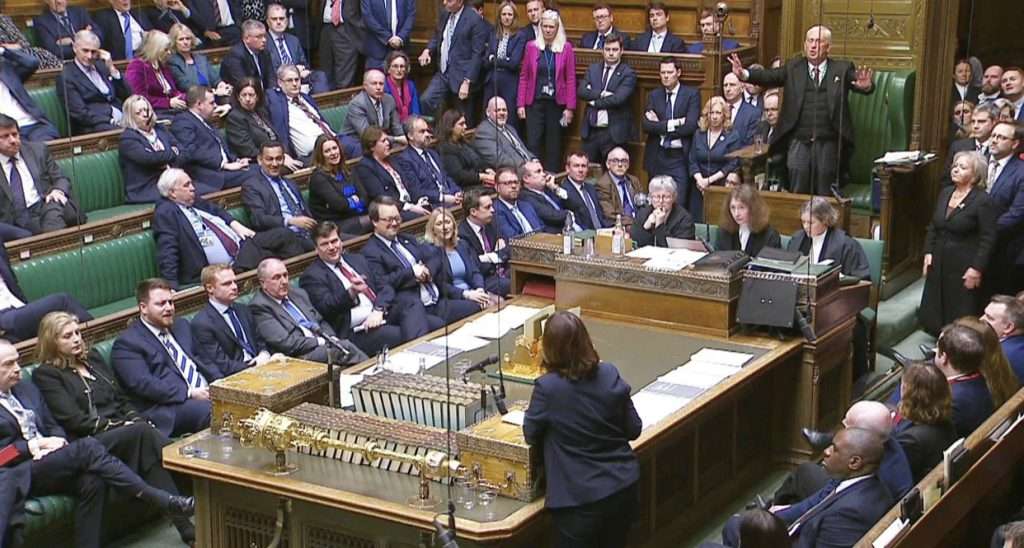Nearly 60 British MPs urge the UK to ban arms sales to Israel

Nearly 60 British MPs and members of the House of Lords have urged the UK to impose a complete ban on arms sales to Israel and to increase transparency regarding the military export licences it issues, according to the Middle East Eye on July 22nd.
These appeals were detailed in a letter dated July 18th, addressed to Foreign Secretary David Lammy and Business Secretary Jonathan Reynolds. The letter comes as Lammy has cautioned Israel that additional sanctions may follow if a ceasefire in Gaza is not achieved.
The UK joined 27 other nations– including Australia, Canada, and France- in condemning Israel for denying Palestinians “human dignity” and called on the Israeli authorities to immediately ease restrictions on humanitarian aid access.
“We’ve announced a raft of sanctions over the last few months,” Lammy told ITV’s Good Morning Britain on July 22nd.
“There will be more, clearly, and we keep all of those options under consideration if we do not see a change in behaviour and the suffering that we are seeing come to an end.”
However, the letter’s signatories- including Zarah Sultana, John McDonnell, and Jeremy Corbyn- argue that the UK must halt all arms exports to Israel immediately or risk being complicit in acts of genocide.
“The components which create the fighter jets that Israel has used to level Gaza are 15% British-made – we cannot hide from that,” said Labour MP Steve Witherden, who coordinated the letter.
“Without British arms export licences, these jets could not fly, they could not drop their bombs.”
The letter comes in the wake of an adjournment debate held last month- the first Commons discussion on arms export licences to Israel since before the Hamas-led attacks on October 7th 2023.
In the letter, MPs and peers requested clarification regarding 2024 UK arms export figures to Israel, published by the Export Control Joint Unit (ECJU), the interdepartmental body responsible for overseeing licences for military and dual-use exports.
During the debate, Trade Minister Douglas Alexander stated that most of the £142 million in military export licences approved for Israel in 2024 covered components destined for re-export to third countries, including NATO allies.
However, the letter challenges this claim, citing ECJU figures that show over half of the £141.6 million in standard individual export licences granted this year appear to be for items intended for direct use in Israel.
“Could the government clarify how this data aligns with the minister’s claim that the majority of these licences were for re-export?” the letter asks.
Alexander also noted that more than £120 million- around 85% of the total value of licences approved in 2023- “were for components to support exports of military items from Israeli companies to a single programme for a Nato ally”.
The signatories have requested further details from the government, including the identity of the NATO ally, the name and scope of the programme, and when it was initiated.
They have also called for an explanation of the spike in individual export licences, valued at £127.6 million and mainly for military radar and targeting systems, issued between October and December 2024- a period after the new Labour government had announced the suspension of approximately 30 arms licences to Israel.
Witherden said that ongoing demands for increased transparency from the government regarding arms sales “have so far gone unanswered”.
“The bare minimum we can do is be fully honest about what we are sending to a state involved in the indiscriminate slaughter of civilians,” he said.
In June, the High Court dismissed a legal challenge brought by human rights organisations seeking to block the indirect export of British-made F-35 fighter jet components to Israel through an international supply chain, ending a 20-month legal battle.
The court ruled that it is lawful for the UK to continue supplying arms used by the forces carrying out the assault on Gaza- a decision that activists say underscores Israel’s impunity and reflects a broader failure to uphold human rights.
In their judgment, the judges concluded that the issue was “for the executive which is democratically accountable to Parliament and ultimately to the electorate, not for the courts”.
Middle East Eye, Maghrebi.org
Want to chase the pulse of North Africa?
Subscribe to receive our FREE weekly PDF magazine












